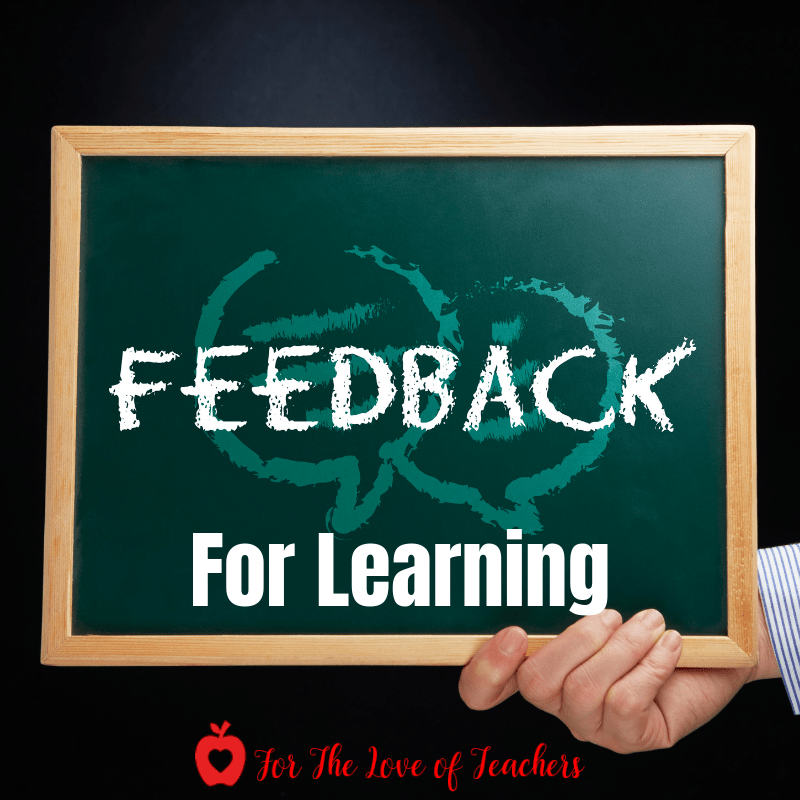
 Emily here from Research Says, bringing you a guest post that focuses on Feedback in the learning space. Research Says is a Professional Learning platform for teachers and educational leaders that compares and summarizes what current research is saying to improve learning outcomes.
Emily here from Research Says, bringing you a guest post that focuses on Feedback in the learning space. Research Says is a Professional Learning platform for teachers and educational leaders that compares and summarizes what current research is saying to improve learning outcomes.
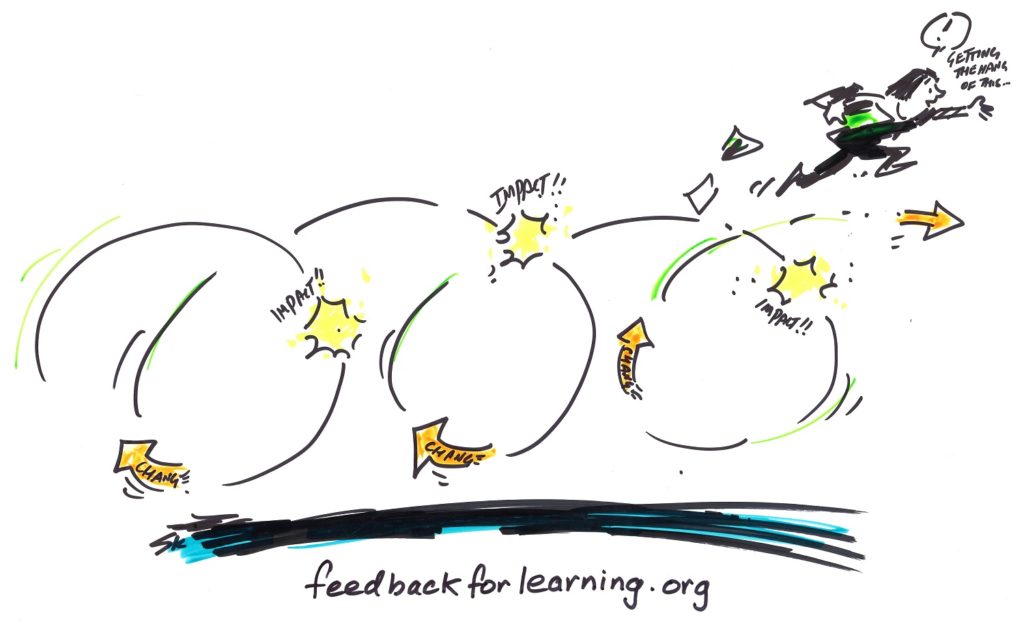
Feedback is a powerful tool to utilize in the learning space and can make a big impact on learners’ achievement, wellbeing and engagement outcomes.
Feedback for learning is about how you as the learner is doing against achieving your goal. True feedback does not provide advice, praise or evaluation, nor does it tell the learner what they have to do.
It’s not in the receiving or the giving of the feedback that impacts the learning it’s how we as learners act on the feedback.
The aim of feedback is to minimize differences between what the learner knows and understands and therefore applies in relation to the intended learning outcome or goal. The difference can be minimized by both learner and teacher taking feedback onboard; learners can increase effort, stop or take up certain strategies.
Through feedback teachers can provide more support, less scaffolding, reteach, altering the goal to be more specific.
it is important to note that authentic feedback is not a one-way street and in order to create a safe learning space it needs to go in all directions
-
Teacher to learner
-
Learner to Learner
-
Learner to Teacher
Feedback from learner to teacher is more often than not more impactful than from teacher to learner, as they are receiving feedback about their teaching.
Effective feedback ensures that the learners know:
-
Where am I going, with my learning?
-
How am I going, with my learning?
-
Where to next, with my learning?
1. Effective feedback connects the intended learning with the learner’s strengths or successes and supports the learner in ways to improve.
Success feedback highlights strengths in their learning – in the areas of
-
Effective use of strategy
-
What the learner did correctly
-
What high-quality learning looks like
2. Effective feedback occurs during the learning, while there is still time to act on the feedback and learn from it.
3. Effective feedback addresses partial understanding.
Feedback is only intended to build on learning; if there is no demonstration of learning then feedback isn’t going to move the learning forward.
One way in figuring out whether the learner requires further instruction rather than feedback is if you cannot find anything in their learning task that is successful towards the intended learning outcomes.
4. Effective feedback does not do the thinking for the learner.
If the learners are provided with too much guidance or instruction then the feedback doesn’t deepen the learning as there is no need for the learners to think for themselves.
5. Effective feedback limits the guidance to a quantity that the learner can act on.
Each learner is different and so is their capacity to respond to feedback, too much corrective feedback at one time can cause a learner to feel overwhelmed and shut down, rest assured no learning in that session will take place.
The teacher needs to know their learners and how they learn so that they can provide as much feedback as the learner can be challenged by yet act on.
How to action this learning?
Ensure the students know the intention of the learning task, create a criteria that demonstrates how they will know they are successful in achieving the intended outcome and provide them with feedback toward achieving said outcomes.

Meet Emily – Founder of Research Says
Professionally I am a learner, teacher, school leader, coach, and research devourer. I honestly love learning, I can’t get enough of it, part of learning is collaborating with others and this I think, if it’s possible, I love this more! It solidifies my knowledge and it actions my learning! This is really where Research Says came from. My dream is that every learner everywhere is exposed to learning experiences that improve outcomes, achievement, wellbeing, and engagement. That’s where Research Says came from; to contribute to building the capacity of teachers and leaders, because we know that teachers make the difference to learning
Related Posts: From The Desk of The Grading Guru and Why “Good Job” Isn’t Enough
Thanks for reading!
If you like it, then pin it!
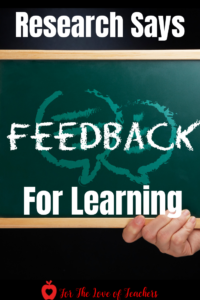
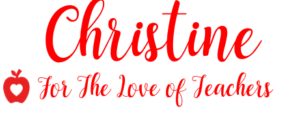 References:
References:
The collective wisdom of authors published in the September 2012 issue of Educational Leadership: “Feedback for Learning.” (Volume 70, Issue 1)
Wiliam, Dylan. (2011). What Is Assessment for Learning? Studies in Educational Evaluation, 37(1), 3-14.
Chappuis, Jan. (2012). “How am I doing?”(Report). Educational Leadership, 70(1), 36-40.

Christine Weis is a passionate educator, classroom management coach, wife, and mom of two busy boys. She enjoys teaching, writing, and creating resources for teachers.

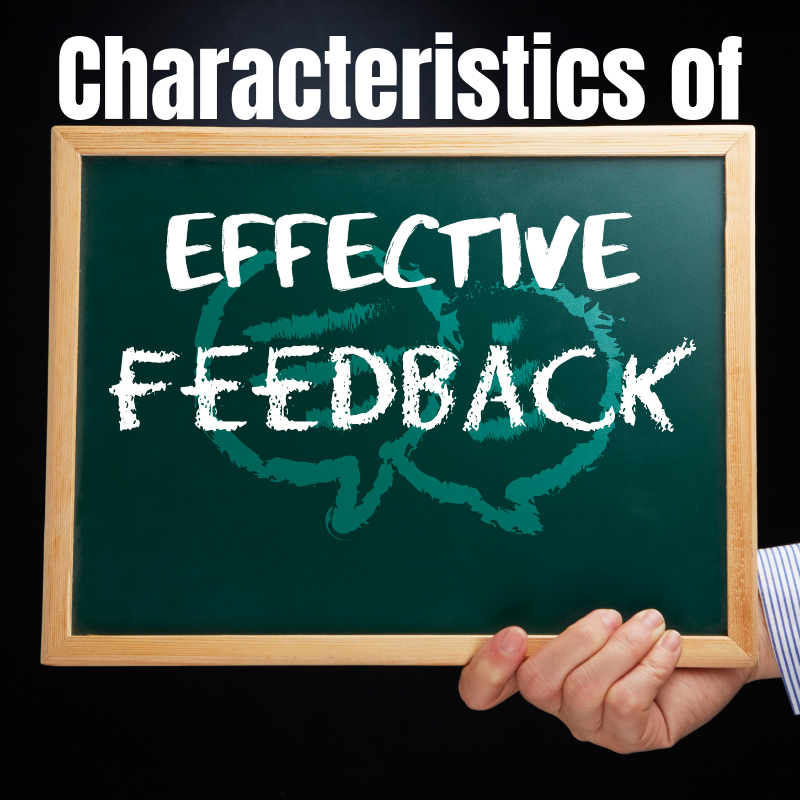

 AI is transforming education! From lesson pla
AI is transforming education! From lesson pla



 Happy Saint Patrick’s Day!
Happy Saint Patrick’s Day! 
 New blog post!
New blog post!  Teaching about the
Teaching about the

 Classroom management hack
Classroom management hack 




Effective feedback is definitely important when giving it or receiving it. This is a lot of great information.
YES! For sure! Thanks for reading!
Christine at For The Love of Teachers
I think that feedback is good as long as it’s done in a way that can teach something as well.
Yes, I agree! Thanks for reading!
Christine at For The Love of Teachers
Hhhhhmmmmm…there is a lot I have learned here and re-learned. Emily, you and I are so much alike….I just can’t get enough of learning; however small or relevant it may be.
I’m so glad! We are all life long learners! I LOVE learning ….and teaching! ;)Thanks for reading!
Christine at For The Love of Teachers
This gave me so much to think about. I too believe that feedback is crucial I believe for a students success. It helps them an improves the environment in the classroom!
I’m so glad! Feedback for learning really helps to build classroom community and promote confidence. Thanks for reading!
Christine at For The Love of Teachers
I just spent the day with Mike Rutherford (The Artisan Teacher) and we discussed feedback extensively. It is critical that a model of success has been presented to the learner so that when the feedback is given, the learner has something to base the feedback on. As the student gets nearer and nearer to success, the feedback likely will turn to encouragement to achieve the goal.
That is awesome! I completely agree! It’s very important that the learner is well aware of the criteria in order for feedback to be relevant & effective. Thanks for reading!
Christine at For The Love of Teachers
Feedback for teachers is very helpful. At the end of each course we ask our students to take a survey where they can share any feedback they want, you can find useful info in there.
You really can…especially for improvement and growth! Thanks for reading!
Christine at For The Love of Teachers
This post really did provide much food for thought. I think so much in a learning environment comes down to the culture of openness and this is set by the teacher from the very beginning. This is just so important in ensuring that learners feel comfortable in being as honest and straight forward as possible. This, in turn, will lead to much better insights into their understanding, and you then have the best quality feedback to work with.
YES! ALL of this is right on point! Once students get comfortable in their learning environment they trust the process of getting and giving feedback, it’s really effective. Thanks for reading!
Christine at For The Love of Teachers
Effective feedback is so important for everyone. Thanks for sharing!
I agree! Thanks for reading!
Christine at For The Love of Teachers
I have always believed in effective feedback addresses partial understanding. I hope this can improve classroom learning!
I hope so too! Thanks for reading!
Christine at For The Love of Teachers
I think as long as the feedback is constructive, a student will thrive in and out of the classroom. It will foster their desire to learn and become more engaged.
Exactly! I prefer feedback to be kind, specific and helpful! Thanks for reading!
Christine at For The Love of Teachers
Feedback for students’ learning is an awesome way to improve a classroom’s environment and make it an awesome place both for the teachers to work and for the students to learn. I love when teachers take the initiative to get feedback from their pupils!
Me too! Giving and receiving feedback is the best part of teaching and learning. Thanks for reading!
Christine at For The Love of Teachers